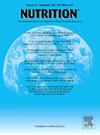Boost or bust? A randomized crossover study on pre-exercise caffeine supplementation for fatigue management in basketball
IF 3.2
3区 医学
Q2 NUTRITION & DIETETICS
引用次数: 0
Abstract
The aim of this study was to to assess the effect of pre-exercise caffeine intake (CAF) on fatigue and recovery in basketball. Using a randomized crossover design, 14 amateur male players completed two basketball-specific training sessions (in-season phase, February–March 2024), preceded by CAF (3 mg/kg body weight) or placebo ingestion (CON). Countermovement jump height, 10- and 20-m sprint times, heart rate variability (Ln-rMSSD), static and dynamic muscle soreness, and perceived fatigue were recorded at pre-training, post-training and 24 h post-training to evaluate the effectiveness of caffeine supplementation. The results showed no significant differences between CAF and CON at corresponding time points for any variable (P > 0.05). Regarding the effect of time, the main findings indicate that countermovement jump (average percentage change [%∆] = –7% to –10%) and Ln-rMSSD (%∆ = –33% to –54%) decreased at post-training compared with all other time points (P < 0.001, effect size = 1.41–1.98), while 10-m sprint times deteriorated from pre-to-post-training (P = 0.029, effect size = 0.69, %∆ = –2%). Similarly, muscle soreness (%∆ = +171%) and perceived fatigue (%∆ = +156%) increased from pre-to-post-training in both interventions (P ≤ 0.006, r = 0.57–0.61), with static soreness in CON (%∆ = +127%) and dynamic soreness in CAF (%∆ = +139%) remaining higher than pre-training levels up to 24 h post-training (P ≤ 0.010, r = 0.53–0.58). These findings suggest that pre-exercise caffeine intake did not significantly affect markers of fatigue in amateur basketball players, either acutely or 24 h post-training.
繁荣还是萧条?运动前补充咖啡因对篮球运动员疲劳管理的随机交叉研究
本研究的目的是评估运动前咖啡因摄入(CAF)对篮球运动疲劳和恢复的影响。采用随机交叉设计,14名业余男性球员完成了两次篮球专项训练(赛季阶段,2024年2月至3月),之前服用CAF (3mg /kg体重)或安慰剂(CON)。在训练前、训练后和训练后24小时记录反动作跳跃高度、10米和20米短跑时间、心率变异性(Ln-rMSSD)、静态和动态肌肉酸痛以及感知疲劳,以评估咖啡因补充的有效性。结果显示,CAF和CON在相应时间点的任何变量(P >;0.05)。关于时间的影响,主要研究结果表明,与所有其他时间点相比,训练后的反动作跳跃(平均百分比变化[%∆]= -7%至-10%)和Ln-rMSSD(%∆= -33%至-54%)下降(P <;0.001,效应量= 1.41-1.98),而10米短跑时间从训练前到训练后逐渐变差(P = 0.029,效应量= 0.69,%∆= -2%)。同样,在两种干预中,肌肉酸痛(%∆= +171%)和感知疲劳(%∆= +156%)从训练前到训练后都有所增加(P≤0.006,r = 0.57-0.61), CON的静态酸痛(%∆= +127%)和CAF的动态酸痛(%∆= +139%)在训练后24小时仍高于训练前水平(P≤0.010,r = 0.53-0.58)。这些研究结果表明,运动前咖啡因摄入对业余篮球运动员的疲劳指标没有显著影响,无论是急性还是训练后24小时。
本文章由计算机程序翻译,如有差异,请以英文原文为准。
求助全文
约1分钟内获得全文
求助全文
来源期刊

Nutrition
医学-营养学
CiteScore
7.80
自引率
2.30%
发文量
300
审稿时长
60 days
期刊介绍:
Nutrition has an open access mirror journal Nutrition: X, sharing the same aims and scope, editorial team, submission system and rigorous peer review.
Founded by Michael M. Meguid in the early 1980''s, Nutrition presents advances in nutrition research and science, informs its readers on new and advancing technologies and data in clinical nutrition practice, encourages the application of outcomes research and meta-analyses to problems in patient-related nutrition; and seeks to help clarify and set the research, policy and practice agenda for nutrition science to enhance human well-being in the years ahead.
 求助内容:
求助内容: 应助结果提醒方式:
应助结果提醒方式:


